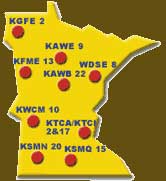By Erin Galbally
Minnesota Public Radio
December 18, 2001
|
| RealAudio |
A looming state deficit could jeopardize the future of Minnesota's six public television stations. Last month the state's finance department put a freeze on new grant agreements. That decision affected a major public television grant designed to help stations meet an expensive federal mandate to go digital by 2003. Twin Cities Public Television, TPT, says it will struggle to meet the federal deadline without state funding. But Minnesota's smaller stations face a much bigger battle. They say it will be impossible to meet the deadline without state help, and some could be forced off the air.
| |
|
|
|
||
Austin's public television station, KSMQ, was already limping before news of the state's projected $2 billion budget shortfall. Overnight, the station's precarious financial status took a dive. That's because the state has frozen a $900,000 grant. The money was earmarked to help KSMQ convert to a digital signal. That's required of all public television stations across the country by May, 2003.
"I hadn't planned for it," says Jude Andrews, KSMQ's general manager. "Perhaps I should have. Perhaps I should have known this would happen but I didn't. I don't think anybody did. So we were given no forewarning on this at all."
Making the switch to digital means replacing every piece of equipment. That will cost the station at least $2 million That's even more than its annual budget. Andrews says with many federal grants contingent on state dollars, the situation is particularly bleak.
"Conceivably, if the money dries up we also dry up. If federal and state money go away, we go away," Andrews says.
The hold on state grant money also hit Appleton's Pioneer Public Television. Appleton is one of the state's smaller and more vulnerable public television stations. It's located about 150 miles west of the Twin Cities, and serves viewers in about 50 rural counties. Glen Cerny, station manager, says while the 2003 digital deadline is of major concern, the freeze on state money puts some programs in immediate jeopardy.
"You start tying up money for a month, and it's going to create a domino effect that will affect a lot of different areas," Cerny says.
| |
|
|
|
||
In particular, Cerny is concerned about a Hispanic GED program the station broadcasts in Willmar. It's already running on a shoestring. Now Cerny's worried a delay in funds will threaten its future.
"I'm concerned - by the middle of January - what we're going to do and how we're going to make those sorts of adjustments," Cerny says. "The only thing that's buying us a little time is that we've just completed a December fund drive, so we've got some time to buy here."
All six of Minnesota's public television stations will be affected by the freeze on state dollars. State Budget Director Peggy Ingison says with a $2 billion budget shortfall there will be cuts. Ingison says she's unfamiliar with the details of the public television grant. But she says generally speaking, the state might be reluctant to pour a large amount of cash into financially-troubled organizations such as Austin's KSMQ and Appleton's Pioneer Public Television.
"This is a one time grant to update to digitalization. I don't know if that would be the sort of thing that would be looked on positively," Ingison says. "If it's an organization that struggles just to manage - it's somewhat like a capital investment when they are having financial problems."
Ingison says funding for public television will be scrutinized next to money designated for programs like K-12 education and nursing homes.
It could be weeks or months before any cuts are finalized at the Capitol. KSMQ station manager Jude Andrews says she and her staff will have to make their own tough choices by February. That includes the possibility of going off the air.
More from MPRMore Information


